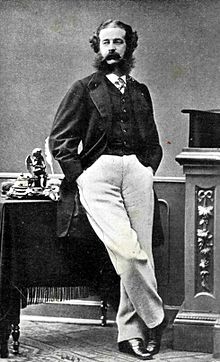Emilio Visconti-Venosta
Emilio Marchese Visconti-Venosta (born January 22, 1829 in Milan , † November 28, 1914 in Rome ) was an Italian conservative politician who was a long-time member of the Camera dei deputati and five times foreign minister in eight different cabinets between 1863 and 1901.
Life
Emilio Visconti-Venosta is the older brother of Giovanni Visconti-Venosta . Visconti-Venosta was originally a supporter of the freedom struggle represented by Giuseppe Mazzini and the idea of "resurrection" ( Risorgimento ) represented by him , but took a more moderate stance after the attempted uprising in Milan in February 1853. In 1861 he was elected for the first time as a member of the Camera dei deputati and represented the Conservatives ( Destra ) in this until 1886 .
After he was Secretary General of the Ministry of Foreign Affairs between December 1862 and March 1863, he was appointed Foreign Minister of Italy for the first time on March 20, 1863 by Prime Minister Marco Minghetti and was a member of its first cabinet until September 28, 1864. In this function he concluded the September Convention in 1864 with Minghetti and the French Foreign Minister Édouard Drouyn de Lhuys , in which the French occupation of Rome was limited to two years.
In March 1866 he was appointed envoy to Constantinople . Between 28 June 1866 and 10 April 1867, he was, however, in the Cabinet of Prime Minister Bettino Ricasoli again Secretary of State, so that the management of the embassy in Constantinople Opel by legation secretary Alberto Blanc as charge d'affaires took place. The post of ambassador was then filled with Giuseppe Bertinatti in May 1867.
He took over the office of foreign minister again on May 13, 1869 in the government of Giovanni Lanza , which was in office until July 10, 1873, and held this office in the subsequent second cabinet of Prime Minister Minghetti until November 20, 1876. It was during this time to serious political and diplomatic problems after the liberation of Rome in 1870, the related Roman question about the status of Rome and which entered into force on February 16, 1871 law of guarantees that the rights of the Pope and the ratio of the former papal States to the Kingdom of Italy after the political disempowerment of the then Pope Pius IX. It guaranteed the pope the inviolability of his person, of the of the Vatican and the Lateran Palace and of Castel Gandolfo . Pius IX In May 1871, he refused the limited rights of sovereignty offered by the Italian King Victor Emmanuel II . Pius and his successors were limited in their radius of action to the immediate Vatican City , which was surrounded by fortifications . In the following years, Visconti-Venosta tried to bring Italy closer to the Central Powers .
After the loss of the supremacy of the conservative Destra, he was not involved in any government for almost twenty years and was in the meantime appointed a member of the Senate ( Senato del Regno d'Italia ) on June 7, 1886 . June 1898 again held the office of foreign minister in the third and fourth cabinet of Prime Minister Antonio Starrabba . Because of a disagreement with him about the opinion to prevent the popular unrest of May 1898, Justice Minister Giuseppe Zanardelli had to resign.
Visconti-Venosta was last appointed Foreign Minister in his second cabinet on May 14, 1899 by Prime Minister Luigi Pelloux and held this ministerial office from June 24, 1900 to February 15, 1901 in the subsequent government of Prime Minister Giuseppe Saracco . During this time he also sought contact with France outside of the Triple Alliance concluded between Italy, the German Empire and Austria-Hungary , in order to improve Franco-Italian relations, which were affected by the race for Africa .
Visconti-Venosta represented Italy between January and April 1906 at the Algeciras Conference to solve the First Moroccan Crisis . The then Foreign Minister Antonino Paternò-Castello preferred him to the Ambassador to Spain , Giulio Silvestrelli , who was originally intended as a conference participant by the previous Foreign Minister Tommaso Tittoni . After that, he largely withdrew into private life.
Awards
He has received several awards for his services and received, among other things, the Knight's Cross from the Order of Announcements , the Grand Cross from the Order of St. Mauritius and Lazarus as well as from the Order of the Crown of Italy . He also received the Grand Cross from the Belgian Order of Leopold , from the Dannebrogden of Denmark , the Knight's Cross from the Red Eagle Order and the Black Eagle Order of the Kingdom of Prussia , the Grand Dignitar from the Order of the Rose of Brazil and the Knight's Cross Fifth Class from the Mecidiye Order .
literature
- Maurizio Binaghi: Emilio Visconti Venosta. In: Historical Lexicon of Switzerland . July 12, 2011 , accessed April 3, 2020 .
Web links and sources
- Biography in L'Enciclopedia Italiana (online version, accessed on July 31, 2012)
- Entry in the Senatori dell'Italia liberale database of the Historical Archives of the Italian Senate
- Entry in the Portale storico of the Camera dei deputati
- Meyers Großes Personenlexikon , Mannheim 1968, p. 1365
| personal data | |
|---|---|
| SURNAME | Visconti-Venosta, Emilio |
| ALTERNATIVE NAMES | Emilio Marchese Viscónti-Venòsta (different spelling of the name) |
| BRIEF DESCRIPTION | Italian politician, member of the Camera dei deputati |
| DATE OF BIRTH | January 22, 1829 |
| PLACE OF BIRTH | Milan |
| DATE OF DEATH | November 28, 1914 |
| Place of death | Rome |
